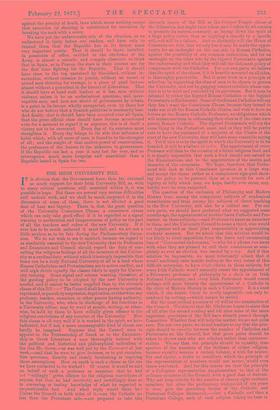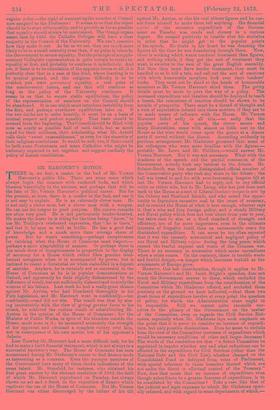THE IRISH UNIVERSITY BILL.
But the most critical question of all will be the nomination of the Council. We observe that Mr. Gladstone hopes to stave this off till after the second reading and till after some of the more important provisions of the Bill have already passed through Committee. Whether that will help the matter, we are not quite sure. For our own parts, we do not hesitate to say that the prin- ciple should be equality between the number of Catholics and Protestants on the Council, but that great pains should be taken to choose men who are scholars rather than controver- sialists. We say that the principle should be equality, irre- the late Mr. Grote,—as was well put by the Economist of last spective of the numbers of the students of either religion, week,—and that he were to give lectures, or to put examina- because equality secures a certain balance, a wish for neutra- IT is obvious that the Government have, thus far, obtained as much support for their Irish University Bill, as, with so many critical questions still unsettled within it, it was possible to hope. But there are several very serious difficulties still undealt with, and we shall be much surprised if, in the discussion of some of them, there is not elicited a good deal of heat and bigotry. There is, first, the great question of the University Conscience Clause, a conscience clause which can only take good effect if it be regarded as a signal warning to moderation and temperateness of policy on the part of all the teachers and rulers of the new University. If it ever has to be much enforced it must fail, and we are not a little anxious as to its fate during the Parliamentary discus- sion. We do not wish to see it omitted, because we regard it as absolutely essential to the new University that its Professors and Examiners and Council should regard the duty of con- sulting the religious feelings of all the members of the Univer- sity as a cardinal duty, without which itis simply impossible that there can be a truly National University at all in a land where Roman Catholicism and Protestantism are in active conflict, and well nigh divide equally the classes likely to apply for Univer- sity training. Some signal and solemn warning, therefore, of the guiding policy to be adopted by the new University is needed, and it cannot be better supplied than by the eleventh clause of this Bill :—" The Council shall have power to question, reprimand, or punish by suspension, deprivation, or otherwise, any professor, teacher, examiner, or other person having authority, in the University, who, when in discharge of his functions as a University officer, may by word of mouth, writing, or other- wise, be held by them to have wilfully given offence to the religious convictions of any member of the University." Now
this clause is all very well if it is worked in the spirit we have indicated, but if not, a more unmanageable kind of clause can hardly be imagined. Suppose that the Council were to appoint to the Professorship of Greek or to the Examiner- ship in Greek Literature a man thoroughly imbued with the political and historical and philosophical radicalism of
tion questions, directly and clearly inculcating or implying those assumptions. How on earth is such a clause as the one we have extracted to be worked ? Of course it would be said on behalf of such a professor or examiner that he had not " willingly " given offence to the religious convictions of anyone, but that he had inevitably and unwillingly done so in conveying or testing knowledge of what he regarded as unquestionable fact. And what reply would there be ? Unless the Council on both sides of it,—on the Catholic no less than the Protestant side,—are prepared to take this against the penalty of death, laws which mean nothing except' eleventh clause of the Bill as the Cowper-Temple clause of that execution by shooting is substituted for execution by the Education Act ought to be taken, and €.8 taken by all anxious
breaking the neck with a screw. to promote its success,—namely, as laying down the spirit of We have put the unfavourable side of the situation, as we a large policy rather than as applying a remedy to a specific
understand it, fairly before our readers, and have only to will be a failure. And so distinctly will the House of remind them that the Republic has in its favour some Commons see this, that we only fear it may be made the oppor- very important points. That it should be there, installed, tunity for an onslaught on the one side by Roman Catholics, in possession of office, entitled to the obedience of the against the possibility of any common instruction, and for an Army, is almost a miracle, and compels observers to think onslaught on the other side by the bigoted Protestants against
the embarrassing and what they will call the dishonest policy of compromise with the Catholics. For our own parts, we believe
that the spirit of the clause, if it is heartily accepted on all sides, is thoroughly practicable. But it must work as a principle of selection, by suggesting the class of men to be chosen to govern the University, and not by gagging controversialists whose con- duct is to be tried and punished by its provisions. But it may be defeated by either the bigoted Roman Catholics or the bigoted Protestants in Parliament. Some of the Roman Catholics will say they don't want the Conscience Clause, because they intend to make use of all the Roman Catholic Chairs, and wish to have no fetters on the Roman Catholic Professors, no obligations which will embarrass them in addressing their class as if the class were purely Roman Catholic. The bigoted Protestants will say the same thing in the Protestant sense, and as they will be pretty sure to have the command of a majority of the Chairs at the start of the new University, they will have some reason for saying it. Yet if this is to be the spirit in which the University is to be founded, it will be a failure al) initio. The appointment of every Professor will then be the occasion of a bitter religious fend, and it is simply impossible that such a feud should not extend to the Examinations, and to the appreciation of the merits and demerits of the examinees. We hope, therefore, that Parlia- ment will look at this Conscience question in a large way, and accept the clause rather as a'conspicuous sign-post show-
ing the policy to be pursued, than as a remedy for acts of bigotry or folly which may, we hope, hardly ever occur, nay, hardly ever be even suspected.
The question of the exclusion of Philosophy and Modern History from among the compulsory subjects of academical examination and from among the subjects of direct teaching in the New University, will also be a critical one. For our own parts, we should have preferred what we suggested some months ago, the appointment of double Chairs, Catholic and Pro- testant, on these subjects,---each Professor to name an examiner in them, and the University Council to name a third, who would act together and on their joint responsibility in appreciating students' answers. But we admit that this solution would be too likely to elicit opposition from the fierce and unreasoning foes of " Concurrent endowment,"—who let a phrase run away with what they are pleased to call their consciences as com- pletely as ever an election was carried by a cry. And if this solution be impossible, we must reluctantly admit that it would needlessly raise hostile feeling at the very outset of this difficult enterprise, to have single chairs in these subjects, for every Irish Catholic would naturally resent the appointment of a Protestant professor of philosophy to a chair in an Irish National University, and every Irish Protestant would resent perhaps still more bitterly the appointnient of a Catholic to the chair of Modern History in such a University. It is a knot which, if the double Chair be really impossible, can only be sundered by cutting,—which cannot be untied.
lity and equity, a desire to conciliate, which the principle of the representation of numbers would not secure, would even throw overboard. And for this reason we view the principle of a Collegiate representation supplementary to that of the ordinary members of the Council, with a good deal of distrust. Why not keep strictly to the number of twenty-eight ordinary members, but after the preliminary trial-period of ten years is over, give the governing bodies of the Catholic and Protestant Colleges alternately,—first a Catholic and then a Protestant College, each of each religion taking its turn in regular order,—the right of nominating the member of Council now assigned to the Professors ? It seems to us that the object should be to start with equality, and to provide as far as possible that equality should always be maintained. The Orange organs assert that by 1885 the Catholic Colleges will have a clear majority in the Council of the University. We can't conceive how they make it out. As far as we see, they are much more likely to be in a small minority even then, if no pains is taken by the Government to secure equality. But the principle of a supple- mentary Collegiate representation is quite certain to create in- equality at first, and probably to continue it indefinitely. And yet, if there is to be calculation of the opposite forces at all, it is perfectly clear that in a case of this kind, where learning is to be neutral ground, and the religious difficulty is to be avoided, you want permanent equality, a real poise of the controversial forces, and one that will continue as long as the policy of the University continues. It seams to us that to secure stable equilibrium, the policy of the representation of numbers on the Council should be abandoned. It is one which must introduce instability from the first, and perhaps overthrow equilibrium later on. If the two faiths are to unite heartily, it must be on a basis of mutual respect and perfect equality. That basis should be secured from the beginning. The Council should be filled with men as nearly as possible half of each faith, but as much noted for their mildness, their scholarship, what Mr. Arnold calls their " sweet reasonableness," as even for the sincerity of their religions convictions. It would be well, too, if there could be both some Protestants and some Catholics who might be uniformly expected to act together and support cordially the policy of honest, conciliation.



































 Previous page
Previous page